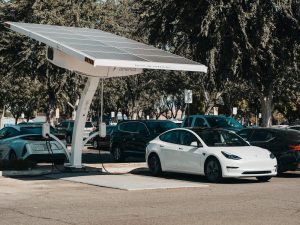As concerns about climate change and environmental sustainability intensify, the automotive industry is undergoing a transformative shift towards electric vehicles (EVs). Electric cars, hailed as a promising solution to reduce carbon emissions and dependence on fossil fuels, have indeed demonstrated significant environmental benefits. However, as we delve deeper into this revolution, a spectrum of questions arises, prompting us to critically evaluate whether electric cars are the definitive long-term solution we seek.
The Environmental Promise:
1. Reduced Emissions:
Electric cars, powered by electricity rather than gasoline, emit fewer greenhouse gases, contributing to cleaner air and a reduction in overall carbon footprints.
2. Energy Efficiency:
EVs tend to be more energy-efficient than their internal combustion engine counterparts, with the ability to convert a higher percentage of stored energy from the power source to the wheels.
3. Reduced Noise Pollution:
Electric vehicles are inherently quieter than traditional cars, potentially contributing to a decrease in noise pollution in urban environments.
Unanswered Questions:
1. Manufacturing Impact:
The production of electric cars involves the extraction and processing of raw materials for batteries, raising concerns about the environmental impact of mining and manufacturing processes.
2. Battery Disposal:
While EVs reduce emissions during their operation, the disposal of lithium-ion batteries presents a significant environmental challenge. Developing sustainable recycling methods for these batteries is crucial.
3. Energy Source:
The environmental benefits of electric cars heavily depend on the energy sources used to generate electricity. If electricity is derived from fossil fuels, the overall impact is mitigated.
4. Infrastructure Challenges:
The shift to electric vehicles necessitates extensive charging infrastructure. The environmental impact of producing and installing charging stations, along with their energy source, adds another layer of complexity.
5. Rare Earth Element Dependency:
Electric vehicles rely on rare earth elements for various components, such as batteries and magnets. The extraction and processing of these elements can result in environmental degradation and geopolitical concerns.
A Holistic Perspective:
While electric cars undeniably offer a cleaner alternative to traditional vehicles, addressing their environmental impact requires a comprehensive approach. Shifting the focus from tailpipe emissions to the entire lifecycle of an electric vehicle is essential. Sustainable sourcing of materials, efficient recycling processes, and advancements in clean energy production are integral components of this approach.
Are electric cars the ultimate solution to our environmental challenges? The answer remains complex.
Increase in Company Car Tax (BIK) Across All Vehicle Types
The Benefit-in-Kind (BIK) rate for zero-emission vehicles is set to increase by 1% each year from 2025 to 2028. Currently at 2%, it will rise to 3% in April 2025, followed by 4% in 2026 and 5% in 2027. For vehicles emitting 75g/km of CO2 or more, the BIK rate will see a 1% increase…
Pick-Up Trucks Lose Company Car Tax Advantage
Well, sort of. Not that we’re suggesting you, a suburban commuter or family car buyer, were eyeing up a pick-up truck purely for tax benefits—of course not. But if you were, no judgement. However, from April 2025, double-cab pick-ups will be taxed as standard passenger vehicles, meaning much higher Benefit-in-Kind (BIK) payments if used as…
VED Increases Coming for Petrol, Diesel, and Hybrid Cars in 2025
From April 2025, vehicle tax rates are set to rise across the board, hitting petrol, diesel, and hybrid cars alike. If you’re considering buying a high-emission vehicle, it might be worth registering it before 1 April 2025 to avoid the steeper tax rates.
CO2-Based Tax Still Makes EVs Cheaper to Run. At Least Initially
While it’s true that EVs no longer get a free pass on road tax, they’re still significantly cheaper to tax in the first year. However, from year two onwards, all vehicles will be subject to the same £195 annual VED charge, along with the Expensive Car Supplement (ECS) of £410 per year for five years…
EV Road Tax is Coming – Even for Older Models
It was inevitable—electric vehicles (EVs) are losing their road tax exemption. From 1 April 2025, any newly registered EV will be subject to a £10 first-year Vehicle Excise Duty (VED) charge, followed by an annual fee of £195 from the second year onwards. Existing EV owners aren’t off the hook either—cars registered between 2017 and…
Major VED Changes in 2025: Road Tax for EVs and More
From April 2025, electric vehicles (EVs) will no longer be exempt from road tax (VED), as confirmed by the Government. Any EVs registered from 1 April 2025 onwards will pay an initial tax of £10 in the first year, followed by an annual charge of £195 from the second year onwards. Existing EV owners won’t…
Supercar Scams
Beware of Supercar Scammers and Protect Yourself from Online Frauds In the exhilarating world of supercars, the allure of owning a powerful amazing new toy can be irresistible. However, with the rise of online marketplaces, there’s also been an unfortunate increase in scams targeting eager buyers. These scams often involve fraudulent listings for supercars that…
All-electric Macan
Introducing the Next Chapter in Electrification: Prototypes of The All-electric Macan In a relatively short span, the Macan has garnered a devoted following since its debut in 2014. Porsche responded to the burgeoning popularity of crossover vehicles by introducing the Macan, strategically bridging the gap between their iconic sports cars and SUVs. While the Cayenne,…
The Power of Customer Retention
Unlocking Growth through Feedback. In the fast-paced world of business, it’s easy to get caught up in the pursuit of acquiring new customers. However, let’s take a moment to reflect on the significance of customer retention – a key driver of sustained success. 🌐 Why is Customer Retention Crucial? Customers are the lifeblood of any…
The Electric Car Revolution: Unpacking Environmental Solutions and Unanswered Questions
As concerns about climate change and environmental sustainability intensify, the automotive industry is undergoing a transformative shift towards electric vehicles (EVs). Electric cars, hailed as a promising solution to reduce carbon emissions and dependence on fossil fuels, have indeed demonstrated significant environmental benefits. However, as we delve deeper into this revolution, a spectrum of questions…




